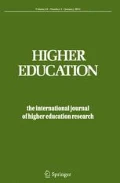Abstract
This paper sets out the conceptual and empirical basis for the concept of study orchestration. The manifestation of study orchestration at a group, and at an individual level, is illustrated by means of an example that captures the range of individual differences, and of individual similarities, that typically occur. The interpretation and the categorisation of study orchestration is discussed and further illustrated by means of examples, as are the linkages between such categorisations and learning outcome. Disintegrated orchestrations, in particular, are discussed and interpreted in more detail by means of interview data. Important properties of individual study orchestration such as their stability and their contextual sensitivity are then addressed in terms of their contribution to intervention programmes for students who may be academically at risk. This paper concludes with a discussion of the concept of metaorchestration which is seen as a logical development of the concept of metalearning and which is viewed as having important consequences in terms of intervention programmes.
Similar content being viewed by others
References
Biggs, J. B. (1978). ‘Individual and group differences in study processes’, British Journal of Educational Psychology 48, 266–279.
Biggs, J. B. (1985). ‘The role of metalearning in study processes’, British Journal of Educational Psychology 55, 185–212.
Biggs, J. B. (1988). ‘Assessing student approaches to learning’, Australian Psychologist 23, 197–206.
Entwistle, N.J., and Kozèki, B. (1985). ‘Relationships between school motivation, approaches to studying, and attainment, among British and Hungarian adolescents’, British Journal of Educational Psychology 55, 124–137.
Entwistle, N., and Ramsden, P. (1983). Understanding Student Learning. Croom Helm, London.
Entwistle, N. J., and Tait, H. (1990). ‘Approaches to learning, evaluations of teaching and preferences for contrasting academic environments’, Higher Education 19, 169–194.
Entwistle, N. J., Meyer, J. H. F., and Tait, H. (1991). ‘Student failure: disintegrated patterns of study strategies and perceptions of the learning environment’, Higher Education 21, 249–261.
Harper, G., and Kember, D. (1989). ‘Interpretation of factor analyses from the approaches to studying inventory’, British Journal of Educational Psychology 59, 66–74.
Marton, F., and Säljö, R. (1976a). ‘On qualitative differences in learning. I - Outcome and process’, British Journal of Educational Psychology 46, 4–11.
Marton, F., and Säljö, R. (1976b). ‘On qualitative differences in learning. II - Outcome as a function of the learner's conception of the task’, British Journal of Educational Psychology 46, 115–127.
Meyer, J. H. F. (1988a). ‘Student perceptions of learning context and approaches to studying’, South African Journal of Higher Education 2, 73–82.
Meyer, J. H. F. (1988b). ‘Qualitative differences in student's perceptions of learning environments’, in Kapp, C. A. (ed.), The Development of Learning and Thinking Skills in Students. Stellenbosch: University of Stellenbosch, pp. 161–173.
Meyer, J. H. F., and Dunne, T. T. (in press). ‘The study orchestrations of nursing students: effects of an extended clinical context’, Medical Education 25.
Meyer, J. H. F., and Muller, M. W. (1990a). ‘An unfolding analysis of the association between perceptions of learning context and approaches to studying’, South African Journal of Higher Education 4 (1), 46–58.
Meyer, J. H. F., and Muller, M. W. (1990b). ‘Evaluating the quality of student learning. I - An unfolding analysis of the association between perceptions of learning context and approaches to studying at an individual level’, Studies in Higher Education 15, 131–154.
Meyer, J. H. F., and Parsons, P. (1989). ‘Approaches to studying and course perceptions using the Lancaster Inventory - A comparative study’, Studies in Higher Education 14, 137–153.
Meyer, J. H. F., and Watson, R. M. (1991). ‘Evaluating the quality of student learning. II - Study orchestration and the curriculum’, Studies in Higher Education 16, 251–275.
Meyer, J. H. F., Dunne, T. T., and Sass, A. R. (forthcoming). ‘The study orchestrations of disadvantaged students: the transition from school to university’.
Meyer, J. H. F., Parsons, P., and Dunne, T. T. (1990a). ‘Individual study orchestrations and their association with learning outcome’, Higher Education 20, 67–89.
Meyer, J. H. F., Parsons, P., and Dunne, T. T. (1990b). ‘Study orchestration and learning outcome: evidence of association over time among disadvantaged students’, Higher Education 20, 245–264.
Parsons, P., and Meyer, J. H. F. (1990). ‘The academically ‘at risk’ student: a pilot intervention programme and its observed effects on learning outcome’, Higher Education 20, 323–334.
Pask, G. (1976). ‘Styles and strategies of learning’, British Journal of Educational Psychology 46, 128–148.
Perry, W. G. (1988). ‘Different worlds in the same classroom’, in Ramsden, P. (ed.), Improving learning: New Perspectives. London: Kogan Page.
Ramsden, P. (1988). ‘Context and strategy. Situational influences on learning’, in Schmeck, R. R. (ed.), Learning Strategies and Learning Styles. New York: Plenum Press.
Ramsden, P., Beswick, D. G., and Bowden, J. A. (1986). ‘Effects of learning skills interventions on first year university students' learning’, Human Learning 5, 151–164.
Ramsden, P., Martin, E., and Bowden, J. (1989). ‘School environment and sixth form pupils' approaches to learning’, British Journal of Educational Psychology 59, 129–142.
Richardson, J. T. E. (1990). ‘Reliability and replicability of the approaches to studying questionnaire’, Studies in Higher Education 15, 155–168.
Säljö, R. (1975). Qualitative Differences in Learning as a Function of the Learner's Conception of the Task. Gothenburg: Acta Universitatis Gothoburgensis.
Van Overwalle, F., Segebarth, K., and Goldschtein, M. (1989). ‘Improving performance of freshmen through attributional testimonies from fellow students’, British Journal of Educational Psychology 59, 75–85.
Author information
Authors and Affiliations
Rights and permissions
About this article
Cite this article
Meyer, J.H.F. Study orchestration: the manifestation, interpretation and consequences of contextualised approaches to studying. High Educ 22, 297–316 (1991). https://doi.org/10.1007/BF00132293
Issue Date:
DOI: https://doi.org/10.1007/BF00132293




